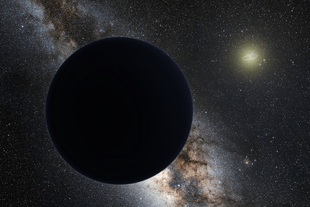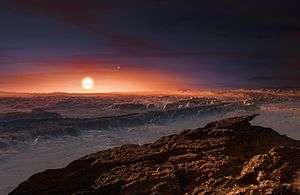Gliese 536 b
| Exoplanet | List of exoplanets | |
|---|---|---|
| Parent star | ||
| Star | Gliese 536 | |
| Right ascension | (α) | 14:01:03.0[1] |
| Declination | (δ) | -02:39:18[1] |
| Distance | 32.71 ly (10.03[1] pc) | |
| Mass | (m) | 0.52 (± 0.05)[1] M☉ |
| Radius | (r) | 0.5 (± 0.05)[1] R☉ |
| Temperature | (T) | 3685.0 (± 68.0)[1] K |
| Metallicity | [Fe/H] | -0.08 (± 0.09)[1] |
| Physical characteristics | ||
| Mass | (m) | 5.36 +0.69 −0.62[2] [3] M⊕ |
| Orbital elements | ||
| Semi-major axis | (a) | 0.066610 +0.000011 −0.000013[2] AU |
| Eccentricity | (e) | 0.080 +0.090 −0.060[2] |
| Orbital period | (P) | 8.7076 +0.0022 −0.0025[2] d |
| Discovery information | ||
| Discovery date | Nov. 2016 | |
| Discoverer(s) | Suárez Mascareño et al.[1][2][3] | |
| Discovery method | Radial Velocity | |
| Discovery status | Confirmed | |
Gliese 536 b also known as GJ 536 b[2][1][3] is a nearby[4][5][6] Super-Earth sized exoplanet orbiting within the circumstellar habitable zone of the red dwarf (M1)[1] star Gliese 536 every 8.7 days. Due to its short orbital period it could help with future studies of biological activity on exoplanets.[5]
References
- 1 2 3 4 5 6 7 8 9 10 "Planet GJ 536 b". exoplanet.eu. Retrieved 2016-11-19.
- 1 2 3 4 5 6 "CONFIRMED PLANET OVERVIEW PAGE". Nasa Exoplanet Archive. Retrieved 2016-11-19.
- 1 2 3 Mascareño, Suárez (November 2016). "A super-Earth orbiting the nearby M-dwarf GJ 536". Astrophysics - Earth and Planetary Astrophysics. arXiv:1611.02122
 . Retrieved 2016-11-19.
. Retrieved 2016-11-19. - ↑ Plummer, Libby. "New super-Earth is discovered nearby: Exoplanet is found orbiting a star 33 light years away - and there could be more.". Daily Mail. Daily Mail. Retrieved 2016-11-19.
- 1 2 "Scientists discover a nearby 'super-Earth' Its short orbital period could help with future studies of biological activity.". Science Daily. Retrieved 19 November 2016.
- ↑ "Scientists discover a nearby superearth". Phys.org. Retrieved 19 November 2016.
This article is issued from Wikipedia - version of the 11/23/2016. The text is available under the Creative Commons Attribution/Share Alike but additional terms may apply for the media files.

.jpg)
